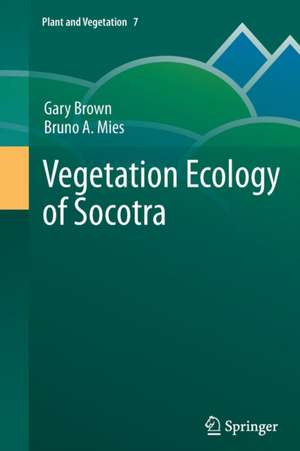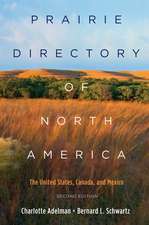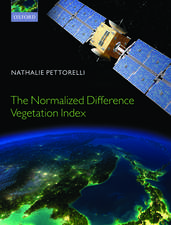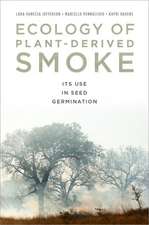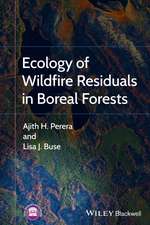Vegetation Ecology of Socotra: Plant and Vegetation, cartea 7
Autor Gary Brown, Bruno Miesen Limba Engleză Paperback – 11 iun 2014
| Toate formatele și edițiile | Preț | Express |
|---|---|---|
| Paperback (1) | 1221.38 lei 43-57 zile | |
| SPRINGER NETHERLANDS – 11 iun 2014 | 1221.38 lei 43-57 zile | |
| Hardback (1) | 1225.94 lei 43-57 zile | |
| SPRINGER NETHERLANDS – 23 mai 2012 | 1225.94 lei 43-57 zile |
Din seria Plant and Vegetation
- 18%
 Preț: 1125.86 lei
Preț: 1125.86 lei - 24%
 Preț: 802.94 lei
Preț: 802.94 lei - 18%
 Preț: 953.52 lei
Preț: 953.52 lei - 15%
 Preț: 642.83 lei
Preț: 642.83 lei - 18%
 Preț: 954.45 lei
Preț: 954.45 lei - 24%
 Preț: 1487.38 lei
Preț: 1487.38 lei - 24%
 Preț: 1329.23 lei
Preț: 1329.23 lei - 24%
 Preț: 962.68 lei
Preț: 962.68 lei - 18%
 Preț: 1405.09 lei
Preț: 1405.09 lei - 18%
 Preț: 1122.42 lei
Preț: 1122.42 lei - 24%
 Preț: 1049.70 lei
Preț: 1049.70 lei - 18%
 Preț: 1222.01 lei
Preț: 1222.01 lei - 18%
 Preț: 1219.16 lei
Preț: 1219.16 lei - 18%
 Preț: 1378.10 lei
Preț: 1378.10 lei - 18%
 Preț: 1230.35 lei
Preț: 1230.35 lei - 18%
 Preț: 966.78 lei
Preț: 966.78 lei - 18%
 Preț: 959.19 lei
Preț: 959.19 lei
Preț: 1221.38 lei
Preț vechi: 1489.49 lei
-18% Nou
Puncte Express: 1832
Preț estimativ în valută:
233.78€ • 254.03$ • 196.51£
233.78€ • 254.03$ • 196.51£
Carte tipărită la comandă
Livrare economică 21 aprilie-05 mai
Preluare comenzi: 021 569.72.76
Specificații
ISBN-13: 9789401784597
ISBN-10: 9401784590
Pagini: 392
Ilustrații: X, 382 p.
Dimensiuni: 155 x 235 x 21 mm
Greutate: 0.55 kg
Ediția:2012
Editura: SPRINGER NETHERLANDS
Colecția Springer
Seria Plant and Vegetation
Locul publicării:Dordrecht, Netherlands
ISBN-10: 9401784590
Pagini: 392
Ilustrații: X, 382 p.
Dimensiuni: 155 x 235 x 21 mm
Greutate: 0.55 kg
Ediția:2012
Editura: SPRINGER NETHERLANDS
Colecția Springer
Seria Plant and Vegetation
Locul publicării:Dordrecht, Netherlands
Public țintă
ResearchCuprins
Preface.- Acknowledgements.- 1. Introduction.- 2. Topography, Climate and Soils.- 3. Geology.- 4. Flora and Biogeography.- 5. Ecology and Adaptive Strategies.- 6. Vegetation.- 7. Environmental Management.- Appendix 1. List of vascular plant species of the Socotra archipelago.- Appendix 2. List of bryophytes of Socotra.- Appendix 3. List of lichens of Socotra.- References.- Index.
Textul de pe ultima copertă
The Socotra Archipelago is a regional biodiversity hotspot with a high degree of endemism, and it is for this reason that it is often referred to as the “Galápagos of the Indian Ocean”. Although its unique flora has received much attention recently, little information is available on the vegetation and related ecological aspects. Based on their own extensive field experience of the region, the authors have assimilated a vast amount of knowledge to produce this book, which gives a detailed insight into the plant ecology of Socotra, designated as a Biosphere Reserve by UNESCO in 2003, and as a World Heritage Site in 2008.
The book is divided into seven chapters. After a brief introduction and overviews of important abiotic features, various aspects of the vascular flora are discussed in Chapter 4, such as biogeography, endemism, dispersal and vicariance, followed by summaries of the bryophyte and lichen flora, including up-to-date checklists of species. Ecology and adaptive strategies of the plants are outlined in Chapter 5, with an emphasis on the arid-land ecosystems, and Chapter 6 gives a concise description of the main vegetation units along an altitudinal gradient, from sea-level to the high mountain peaks at ca. 1550 m. At lower altitudes, desert communities and succulent scrub vegetation dominate, but with increasing elevation, woodland and forest become more prevalent. The final chapter addresses important management issues for the flora and vegetation, issues which, given the rapidly increasing anthropogenic pressures, are critical to preserving as much of the natural heritage of the archipelago as possible. Throughout the book, comparisons are made with the situation in other parts of the world, and in particular, the close affinities with Dhofar in southern Oman and the Canary Islands off the coast of West Africa are underlined.
The book is divided into seven chapters. After a brief introduction and overviews of important abiotic features, various aspects of the vascular flora are discussed in Chapter 4, such as biogeography, endemism, dispersal and vicariance, followed by summaries of the bryophyte and lichen flora, including up-to-date checklists of species. Ecology and adaptive strategies of the plants are outlined in Chapter 5, with an emphasis on the arid-land ecosystems, and Chapter 6 gives a concise description of the main vegetation units along an altitudinal gradient, from sea-level to the high mountain peaks at ca. 1550 m. At lower altitudes, desert communities and succulent scrub vegetation dominate, but with increasing elevation, woodland and forest become more prevalent. The final chapter addresses important management issues for the flora and vegetation, issues which, given the rapidly increasing anthropogenic pressures, are critical to preserving as much of the natural heritage of the archipelago as possible. Throughout the book, comparisons are made with the situation in other parts of the world, and in particular, the close affinities with Dhofar in southern Oman and the Canary Islands off the coast of West Africa are underlined.
Caracteristici
First comprehensive account of the vegetation ecology of the remarkable island of Socotra Ca. 250 photographs, about half of which in colour Includes comparisons with other islands from a biogeographical perspective Includes comprehensive checklist of the lichens of Socotra
